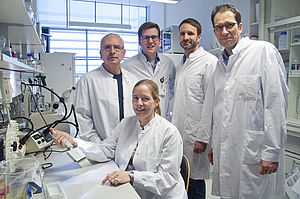Epilepsy comes in a variety of forms. Those affected by a genetically determined variety have severe epileptic seizures as early as the first year of life. The disease is accompanied by severe developmental disorders: it is difficult for them to walk, they have difficulty concentrating and later have problems with speech, spelling and calculations. Until now, this form of epilepsy has been difficult to treat with the usual drugs. Researchers from Tübingen have now used a drug for the first time that is actually approved for the treatment of multiple sclerosis. It directly counteracts the underlying genetic defect and successfully alleviates the symptoms of the patients, reports the team led by Dr. Ulrike Hedrich-Klimosch, Dr. Stephan Lauxmann and Prof. Dr. Holger Lerche from the Hertie Institute for Clinical Brain Research, the University Hospital and the University of Tübingen. This implies that for the first time, affected children and adults will have access to a pharmacological treatment. The results have been published in the journal Science Translational Medicine.
The cause of this form of early childhood epilepsy is a rare genetic defect. Mutations in the KCNA2 gene lead to defective potassium channels in the brain. "Potassium channels are small pores located in the cell membrane of nerve cells and are important for the transmission of electrical signals," ex-plains first author and biologist Hedrich-Klimosch. "In some subtypes of the disease, the mutations lead to increased activity of the channel. In these cases, we speak of a gain-of-function mutation."
For the first time, the research team utilized a therapy medication that specifically targets this point. "In this case, a cause-related therapy must inhibit the increased channel activity," explains co-first author and neurologist Lauxmann. "One such channel blocker is the active substance 4-aminopyridine. It specifically inhibits the overactivity of the potassium channels and is the active compound of a drug approved for the treatment of gait disorders in multiple sclerosis patients." In cooperation with eight other centers worldwide, the team treated eleven patients in n-of-1 trials with the drug. The results were encouraging: The symptoms improved in nine of them. "The number of daily epileptic seizures was reduced or disappeared completely. The patients were generally much more alert and mentally fitter in everyday life. Their speech also improved after starting the drug treatment."
The drug does not work for all subtypes of the disease. In some cases, the gene mutation leads to restricted activity of the potassium channels. The researchers have created a database so that doc-tors can quickly decide whether the drug can help a patient with a newly diagnosed KCNA2 gene defect or not. It lists the different mutations from the KCNA gene family and the associated effects on the potassium channel. In this way, a therapy can be started quickly and the often severe course of the disease can be alleviated.
"Epilepsies caused by KCNA2 gene mutations are very rare diseases. Worldwide, not many more than 50 cases are known," reports study leader and neurologist Lerche. The development of a suitable drug for these "orphans of medicine" is usually too expensive and not profitable enough for pharmaceutical companies. "We are all the more pleased when we can help these patients individually with so-called drug repurposing: The use of drugs that are actually approved for other diseases."
The research team was awarded the Eva Luise Köhler Research Prize for Rare Diseases 2018 for carrying out the project. The study was also funded by the Research Group FOR-2715 of the German Research Foundation (DFG) with the topic "Epileptogenesis of genetic epilepsies" and the Research Network for Rare Ion Channel Disorders ("Treat-ION") of the Federal Ministry for Education and Research (BMBF).
Publication:
Hedrich, U.B.S., Lauxmann, S. et al. 4-Aminopyridine is a promising treatment option for patients with gain-of-function KCNA2-encephalopathy. Science Translational Medicine (2021)
DOI: 10.1126/scitranslmed.aaz4957

Received the Eva Luise Köhler Research Prize for Rare Diseases 2018 for the project: Dr Ulrike Hedrich-Klimosch, Dr Markus Wolff, Dr Stephan Lauxmann, Dr Thomas Wuttke, Prof. Dr Holger Lerche (from left to right).
Copyright: Kardinal | Hertie Institute for Clinical Brain Research (HIH)
Contact:
Dr. Ulrike Hedrich-Klimosch
University of Tübingen and University Hospital Tübingen
Hertie Institute for Clinical Brain Research
Hoppe-Seyler-Straße 3
72076 Tübingen
Phone +49 7071 29-81984
Ulrike.Hedrich[at]uni-tuebingen.de
Prof. Dr. Holger Lerche
University of Tübingen and University Hospital Tübingen
Hertie Institute for Clinical Brain Research
Hoppe-Seyler-Straße 3
72076 Tübingen
Phone +49 7071 29-80466
Holger.Lerche[at]uni-tuebingen.de









